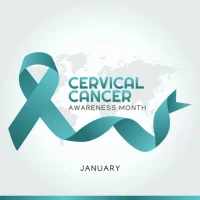New research, funded by Cancer Research UK and published in The Lancet, found 87% lower cervical cancer rates in English women who were offered the Cervarix human papillomavirus (HPV) vaccine vaccinated at ages 12 and 13 than unvaccinated women of similar age. This study provides the first direct evidence of Cervarix‘s effectiveness in lowering cervical cancer incidence.
HPV causes genital warts and 5% of cancers globally, including cervical, throat, and anal cancers. Cervical cancer is the 4th most common cancer in women, killing over 300,000 deaths each year. About 99% of cervical cancers are caused by HPV. It is expected that 80% of women are exposed to cancer-causing HPVs at some point in their lives. First offered in 2008, Cervarix is the bivalent vaccine used in this study and protects against two of the most common cancer-causing HPV viruses. Gardasil, which protects against four different common cancer-causing HPV infections, later replaced Cervarix by 2012.
The study compared, by age, cervical cancer incidence between 1 Jan 2006 and 30 June 2019 in women who received Cervarix to that of unvaccinated women. The National Cancer Registration and Analysis Service, Public Health England, provided incidence data on women aged 20–64 years, resident in England. The researchers separately analyzed International Classification of Diseases-10 codes, C53 for cervical cancer and D06 for CIN3 precancerous cervical abnormalities.
Cervical cancer incidence (C53) among women vaccinated at 12 to 13 is 87% lower than unvaccinated women. Those vaccinated at ages 14 to 16 and 16 to 18 saw cervical cancer rates reduced by 62% and 34%, respectively. Those vaccinated at ages 12 to 13, 14 to 16, and 16 to 18 saw CIN3 rates (D06) drop by 97%, 75%, and 39%, respectively. It is important to note that HPV exposure due to lifestyle and behaviour differences affects exposure among the age groups—those receiving the vaccine when older may have already been exposed. Thus, the vaccine's protection in older women may be lower.
Source: The Lancet
Latest Articles
Tomosynthesis, HPV, cervical cancer, breast screening, womens health care
New research, funded by Cancer Research UK and published in The Lancet, found 87% lower cervical cancer rates in English women who offered the Cervarix human papilloma virus(HPV) vaccine vaccinated at ages 12 and 13 than unvaccinated women of similar age.








